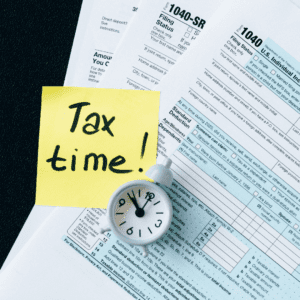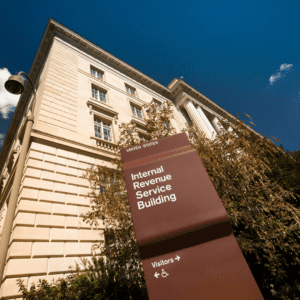Tax season is fast approaching, and if you find yourself scrambling to file your taxes at the last minute, don’t worry—you’re not alone. Whether you’re a procrastinator or simply didn’t realize how much you still need to do, you can still get your taxes filed correctly, even under time pressure. Here’s your essential guide on how to file your taxes in 2025, with a handy checklist for last-minute filers to help you stay organized and avoid costly mistakes.
What to Do If You’re Running Late on Taxes
If you’re reading this and it’s already April 15 (or even later), you still have options to get your taxes filed before the deadline. Here’s what you should do:
1. Don’t Panic—Take a Deep Breath
The first thing to do is stay calm. Filing your taxes late can be stressful, but taking things one step at a time will help you manage the process.
2. File for an Extension (If Needed)
If you can’t get your return filed by the deadline, consider filing for an extension. This gives you an additional six months to file your taxes. However, remember: an extension only gives you more time to file, not more time to pay. You’ll still need to pay any taxes owed by the original deadline to avoid penalties and interest.
3. Gather Your Essential Tax Documents Quickly
Even if you’re pressed for time, you can’t file accurately without the proper documents. Start gathering your paperwork immediately, such as:
-
Income Documents: W-2s, 1099s, 1099-Ks, 1099-NEC, 1099-MISC, and any other relevant income forms.
-
Deductions: Receipts for charitable donations, mortgage interest, medical expenses, and any other deductions you plan to claim.
4. Use Online Tax Tools for Faster Filing
If you’re filing your taxes yourself and you’re in a rush, use IRS Free File or other trusted tax software that offers fast, step-by-step filing guides. These tools also help reduce mistakes and ensure that your return is accurate.
5. Check for Key Tax Changes in 2025
Make sure you’re aware of any recent changes to tax laws that could affect your filing. For example:
-
Increased standard deduction: For 2025, the standard deduction has been raised to $14,600 for single filers, $21,900 for head of household, and $29,200 for married couples filing jointly.
-
Child Tax Credit (CTC): The maximum CTC remains at $2,000 per qualifying child, with a phase-out at $200,000 (single filers) or $400,000 (married couples).
-
Earned Income Tax Credit (EITC): Now requires individuals without children to be between 25 and 65 years old to qualify.
Checklist for Last-Minute Tax Filers
To ensure you don’t miss anything important, use this checklist to stay on track and file your taxes quickly and accurately.
Personal Information
-
Social Security Numbers (SSNs) or ITINs for yourself, spouse, and dependents
-
Bank account details (for direct deposit or payments)
-
IRS IP PIN, if applicable
-
Last year’s tax return (to help with consistency)
Income Documents
-
W-2 forms from employers
-
1099 forms for freelance, gig, and self-employed income
-
1099-K forms for online payment apps (PayPal, Venmo, etc.) over $5,000
-
Other income: rental, investment, retirement income, unemployment benefits
Deductions & Credits
-
Receipts for charitable donations and medical expenses
-
Mortgage interest and property taxes paid
-
Retirement contributions (IRA, HSA)
-
Education expenses (tuition, books)
-
Childcare expenses (if applicable)
Self-Employment Records
-
Income logs (from gig work, freelancing, etc.)
-
Receipts for business expenses (mileage, office supplies, home office)
-
Estimated tax payments made throughout the year
What to Do If You’ve Missed the Tax Filing Deadline
If you’ve missed the tax deadline and didn’t file for an extension, don’t worry—there are still steps you can take to minimize penalties:
-
File as soon as possible: The longer you wait, the higher your penalty could be. The IRS charges penalties for both late filing and late payment.
-
Pay what you owe: Even if you can’t pay the full amount right away, pay as much as you can to reduce penalties and interest. The IRS offers installment plans if needed.
-
Consider Professional Help: If you’re overwhelmed, reaching out to a CPA can help get your filing back on track quickly. They can also assist with filing back taxes if you’ve missed several years.
How to Avoid Late Tax Filing in the Future
While we all find ourselves in a crunch from time to time, here are a few tips for avoiding this stress next year:
-
Track income and expenses regularly: This can save you a lot of time at the end of the year.
-
Make estimated tax payments throughout the year: If you’re self-employed, consider setting aside money every quarter to avoid a large tax bill in April.
-
Use accounting software: Tools like QuickBooks or FreshBooks can help you
-
stay organized all year.

Why Boxelder is Here to Help
Whether you’re filing at the last minute or simply need guidance on how to file correctly, Boxelder is here for you. Our team of expert CPAs specializes in helping small businesses and individuals prepare for tax season w
ithout the stress.
-
Maximize your tax savings: We’ll ensure you claim all eligible deductions and credits.
-
Avoid penalties: We can help you file late returns and navigate any penalties you may face.
-
Expert advice and tax filing support: We’ll help you stay organized year-round, so next tax season is stress-free.
Contact Boxelder today to get started on your 2025 tax filing and avoid unnecessary stress!



